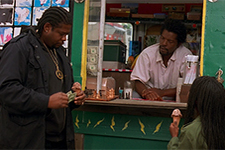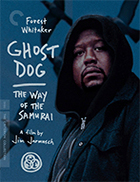Ghost Dog: The Way of the Samurai
|  Most film scholars will tell you that there are two quintessential American genres: the Western and the gangster film. Because iconoclastic independent writer/director Jim Jarmusch had already deconstructed the Western in Dead Man (1995), it was only logical that for his next narrative film he would turn his sights on the gangster film. In Ghost Dog: The Way of the Samurai, Jarmusch mixes elements of the two most popular ethnic gang narratives—the Italian mobsters and the black gangstas—to create a jarring if not entirely bizarre recreation of the postmodern criminal underworld. Jarmusch’s world is a place where organized crime is a refuge for old, outdated men who are so pathetic that the landlord is threatening them for owing two months’ rent on the Chinese restaurant they use as a nightclub, and their best hit man is an inner-city African American who subscribes to the ancient ways of the samurai warrior sect. This hit man goes by the name of Ghost Dog, and he is played with guarded silence and deep sincerity by Forest Whitaker (who would win an Oscar a few years later for playing the African dictator Idi Amin in 2007’s The Last King of Scotland). Ghost Dog lives as the ancient Japanese samurai warriors did, and his guide is an 18th-century warrior manual by Yamamoto Tsunetomo called Hagakure: The Book of the Samurai. At certain intervals (13 times throughout the film), Jarmusch fills the screen with instructive passages from the manual, while Whitaker’s Ghost Dog reads them aloud on the soundtrack. These passages range from philosophical Buddhist teachings (“form is emptiness; emptiness is form”) to instructions on how a samurai may use rouge to improve his complexion. The narrative itself is fairly straightforward: Ghost Dog has become the retainer of a low-level New Jersey mobster named Louie (John Tormey), a man who once saved his life. Being Louie’s retainer means that Ghost Dog swears eternal obedience to his master (the worst thing that can happen to a samurai is for his master to be killed). Ghost Dog makes the mistake of carrying out an assigned hit in front of the daughter of one of Louie’s bosses, so the bosses decide that Ghost Dog needs to be rubbed out for his mistake (the logic by which these bosses decide that Ghost Dog is somehow at fault is strained at best, ludicrous at worst). This narrative is spare, and it allows for Jarmusch’s favorite activity: observing the usually unobserved details in life. Those viewers who approach Ghost Dog expecting a suspense-filled crime-world shoot-em-up will be satisfied with the levels of violence and the body count (although the shoot-outs are done in a stark, almost perfunctory style that drains them of the expected vicarious excitement), but might find themselves restless at the long stretches in-between. There are numerous scenes depicting Ghost Dog’s growing friendship with a young girl named Pearline (Camille Winbush), with whom he shares books (including a copy of Rashomon). There are also several sequences between Ghost Dog and his best friend, a French-speaking Haitian ice cream vendor named Raymond (Isaach De Bankolé). Of course, Ghost Dog and Raymond have no idea what the other is actually saying, but somehow they always manage to communicate. Ghost Dog: The Way of the Samurai takes its time in developing its story and characters. Some find Jarmusch’s films intolerable in their languorous pacing and long takes, and while that tendency is sometimes overwrought, it is restrained in here through a number of methods, most notably the soundtrack by RZA, one of the members of the Wu-Tang Clan, and a fine performance by Forest Whitaker. Whitaker is completely convincing as both a professional killer with nerves of steel and as a generally soft-hearted man who likes to eat ice cream in the park. He has a soft, amiable face that can tighten into a mask of steely determination in a heartbeat; I couldn’t imagine another actor in the role. It helps the film immeasurably that it is often quite funny. Jarmusch has always had a sharp sense of wit and gallows humor, and his films are often funny to those who are willing to get the jokes. Ghost Dog has moments of broad-based humor, such as when Ghost Dog bursts in on a couple of the mafia cronies who want to whack him, and one of them is so old and wheezy that he literally has a heart attack and dies before he can be shot. There is also the hilarious sequence in which Louie tries to explain his admittedly strange professional relationship with Ghost Dog (they communicate via carrier pigeons) to the incredulous higher-ups in his organization. In addition to the humor and violence, there is a constant, uneasy current about race in the film, which is brought to a head when Ghost Dog runs across a couple of racist illegal bear hunters on a country highway. That Ghost Dog had previously been compared to a bear makes the sequence all the more symbolic. But, how exactly that fits in with the rest of the film is a bit questionable, and if Ghost Dog has a weakness, it is that all the parts don’t quite come together. Of course, Jarmusch is engaged in an act of deconstruction, not construction, so some loose ends and ill-fitting remnants are expected. Ghost Dog: The Way of the Samurai is certainly not a conventional film, although it sometimes feels that way on a strictly narrative level (the climax is right out of High Noon, but it is so blatantly iconic that it has to be subversive). It seems most clear that Jarmusch is making a statement about modern urban alienation, especially within the crumbling inner city. Ghost Dog’s adherence to a samurai warrior code may seem distinctly out of place in the world of organized crime at the beginning of the 21st century, but perhaps it can be seen as a fight against current tendencies to refuse definitions and constantly muddy the waters (a not-so-subtle irony in a film that deconstructs a classic American genre). While there is a great deal of conniving and backstabbing amongst the mafiosos, there is never any doubt as to where Ghost Dog stands, which is what makes him stand out. In the strangest of worlds, he is the lone rock, a man who has a code and actually lives by it, even if that means his death. The simple fact that he lives by a code, more than the fact that said code is ancient in origin, is what makes him an anachronism in his own time.
Copyright © 2020 James Kendrick Thoughts? E-mail James Kendrick All images copyright © The Criterion Collection | |||||||||||||||||||||||||||||
Overall Rating: 


 (3.5)
(3.5)


